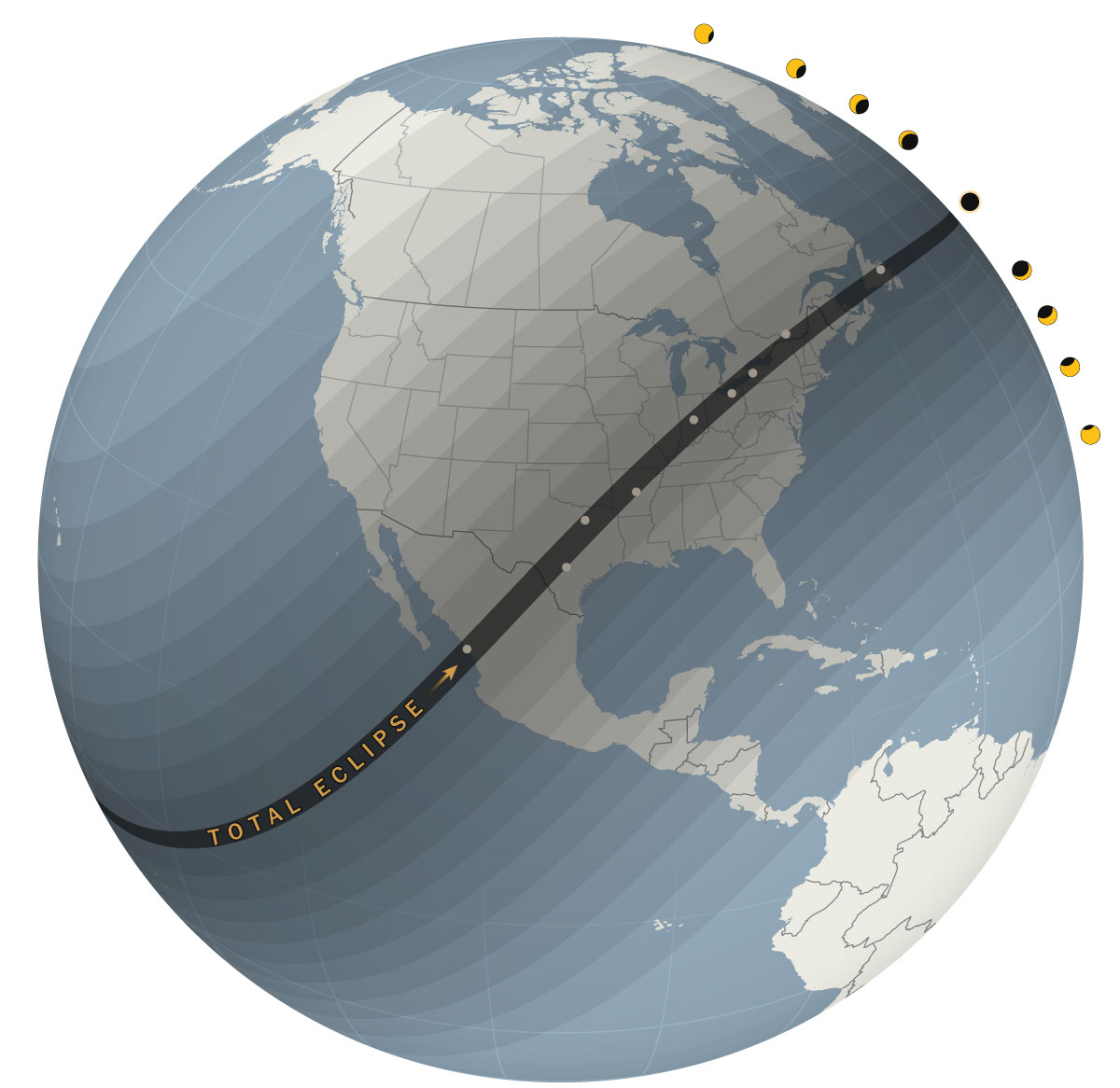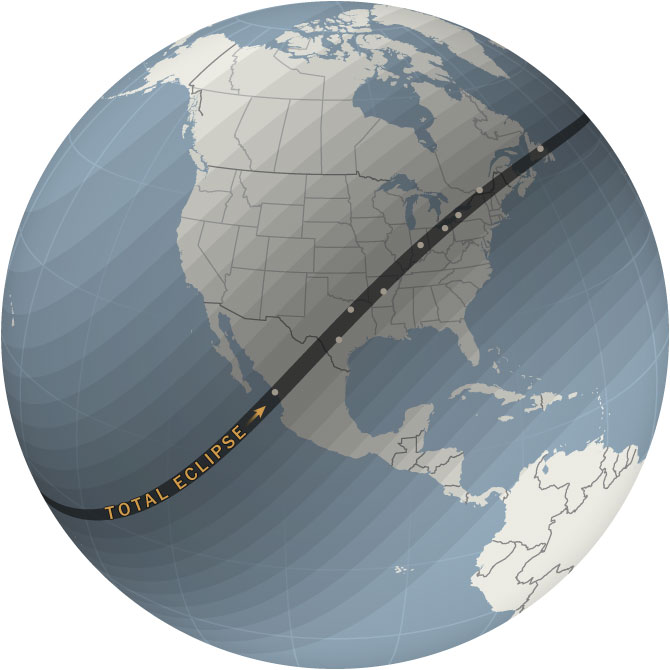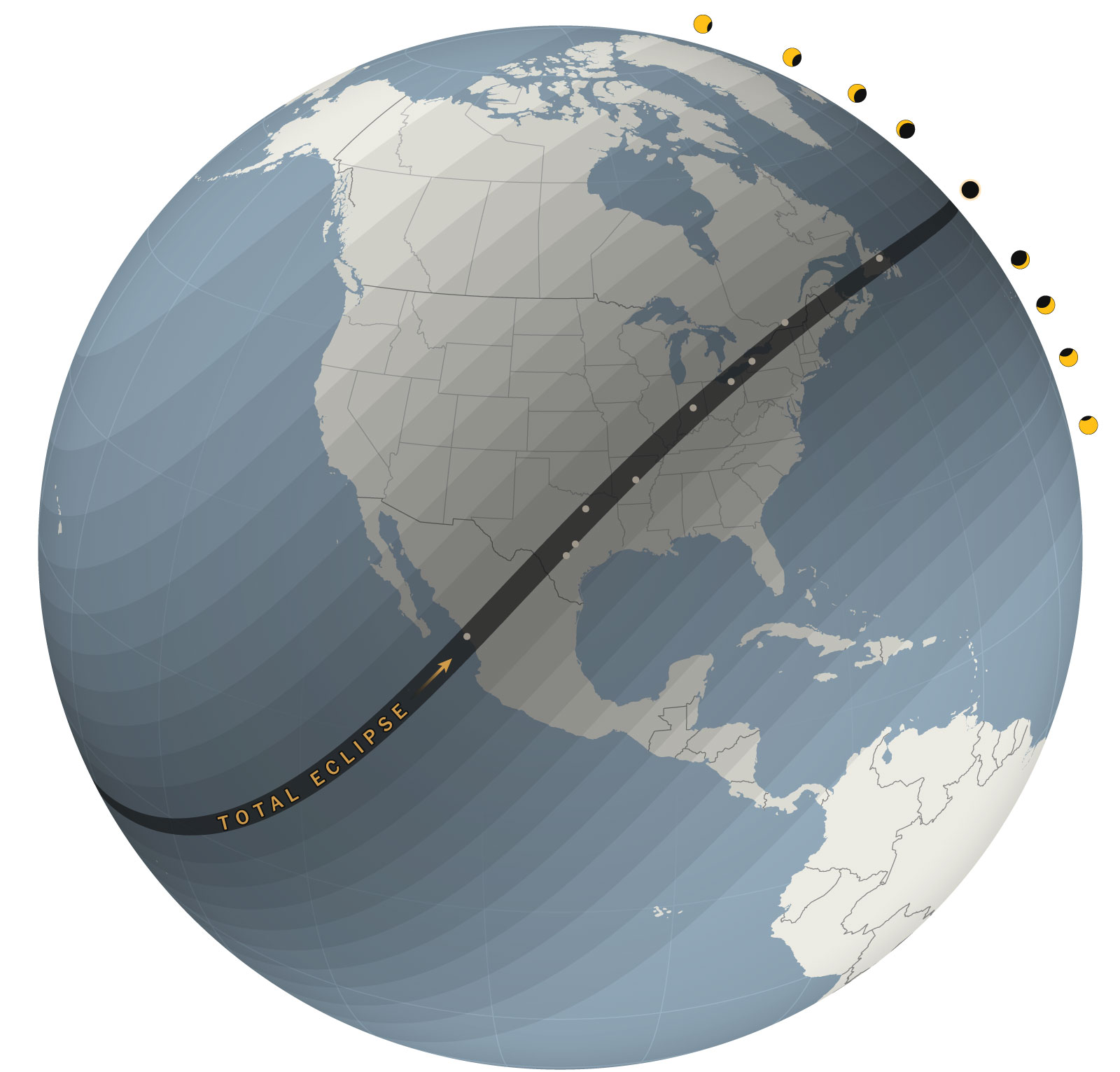On April 8, parts of 13 U.S. states, Mexico and Canada will plunge into midday darkness. Miss this spectacle and you’ll have to wait till 2044 for the next one so close to home.
On April 8, a total solar eclipse will blot out the sun for roughly 4,200 miles stretching from Mexico to Canada — a cosmic show that so much of North America won’t see again for about 20 years. Many made their plans to view it well in advance.
And then there are the procrastinators, who just realized they’re about to miss out. If that’s you, you’ve still got options, but not as many.
“At this point, your goal is just to get to the path of totality and see the eclipse for the longest possible time,” said Melanie Fish, the head of global public relations for Expedia Group Brands. “You’re not trying to find the best party. You’re not trying to make it into your dream vacation. You just want to get to the path of totality.”
So first, get your hands on some eclipse glasses so you can safely watch. Then find a way to get yourself into the path of totality, the strip running across 13 states where the moon will fully eclipse the sun. You’ll be competing with people who have already spiked the demand for flights and accommodations, so be ready to pay more.
And take off the next day, too, if you can. Otherwise, you may spend hours caught in traffic, as many discovered after the 2017 eclipse.
Here are four strategies for a last-minute foray into the total-eclipse zone.
The Path of the Eclipse
On April 8, a total solar eclipse will cross North America from Mazatlán, Mexico, to the Newfoundland coast near Gander, Canada. Viewers outside the path of the total eclipse will see a partial eclipse, if the sky is clear.
#g-globe-box {
max-width:800pxpx;
}
#g-globe-box ,
#g-globe-box .g-artboard {
margin:0 auto;
}
#g-globe-box p {
margin:0;
}
#g-globe-box .g-aiAbs {
position:absolute;
}
#g-globe-box .g-aiImg {
position:absolute;
top:0;
display:block;
width:100% !important;
}
#g-globe-box .g-aiSymbol {
position: absolute;
box-sizing: border-box;
}
#g-globe-box .g-aiPointText p { white-space: nowrap; }
#g-globe-800 {
position:relative;
overflow:hidden;
}
#g-globe-800 p {
font-family:nyt-franklin,arial,helvetica,sans-serif;
font-weight:300;
line-height:17px;
height:auto;
opacity:1;
letter-spacing:0em;
font-size:15px;
text-align:left;
color:rgb(51,51,51);
top:1.2px;
position:static;
text-transform:none;
padding-bottom:0;
padding-top:0;
mix-blend-mode:normal;
font-style:normal;
}
#g-globe-800 .g-pstyle0 {
line-height:6px;
height:6px;
font-size:12px;
top:1px;
position:relative;
}
#g-globe-800 .g-pstyle1 {
height:17px;
text-align:right;
position:relative;
}
#g-globe-800 .g-pstyle2 {
font-weight:600;
line-height:6px;
height:6px;
font-size:12px;
top:1px;
position:relative;
}
#g-globe-800 .g-pstyle3 {
font-weight:700;
line-height:6px;
height:6px;
font-size:12px;
top:1px;
position:relative;
}
#g-globe-800 .g-pstyle4 {
line-height:14px;
height:14px;
font-size:16px;
text-align:center;
color:rgb(221,221,221);
top:1.3px;
position:relative;
}
#g-globe-800 .g-pstyle5 {
line-height:15px;
height:15px;
letter-spacing:0.17em;
font-size:13px;
text-align:center;
color:rgb(221,221,221);
top:1px;
position:relative;
}
#g-globe-800 .g-pstyle6 {
line-height:14px;
height:14px;
font-size:16px;
text-align:right;
color:rgb(221,221,221);
top:1.3px;
position:relative;
}
#g-globe-800 .g-pstyle7 {
line-height:14px;
height:14px;
font-size:16px;
color:rgb(221,221,221);
top:1.3px;
position:relative;
}
#g-globe-800 .g-pstyle8 {
font-family:nyt-cheltenham,georgia,serif;
font-style:italic;
line-height:16px;
height:16px;
letter-spacing:0.09em;
font-size:14px;
text-align:center;
color:rgb(153,177,195);
}
#g-globe-600 {
position:relative;
overflow:hidden;
}
#g-globe-600 p {
font-family:nyt-franklin,arial,helvetica,sans-serif;
font-weight:300;
line-height:15px;
height:auto;
opacity:1;
letter-spacing:0em;
font-size:13px;
text-align:left;
color:rgb(51,51,51);
top:1px;
position:static;
text-transform:none;
padding-bottom:0;
padding-top:0;
mix-blend-mode:normal;
font-style:normal;
}
#g-globe-600 .g-pstyle0 {
height:15px;
text-align:right;
position:relative;
}
#g-globe-600 .g-pstyle1 {
line-height:4px;
height:4px;
font-size:11px;
top:0.9px;
position:relative;
}
#g-globe-600 .g-pstyle2 {
font-weight:600;
line-height:4px;
height:4px;
font-size:11px;
top:0.9px;
position:relative;
}
#g-globe-600 .g-pstyle3 {
font-weight:700;
line-height:4px;
height:4px;
font-size:11px;
top:0.9px;
position:relative;
}
#g-globe-600 .g-pstyle4 {
line-height:18px;
height:18px;
font-size:15px;
text-align:center;
color:rgb(221,221,221);
top:1.2px;
position:relative;
}
#g-globe-600 .g-pstyle5 {
line-height:16px;
height:16px;
letter-spacing:0.17em;
text-align:center;
color:rgb(221,221,221);
position:relative;
}
#g-globe-600 .g-pstyle6 {
line-height:18px;
height:18px;
font-size:15px;
text-align:right;
color:rgb(221,221,221);
top:1.2px;
position:relative;
}
#g-globe-600 .g-pstyle7 {
line-height:18px;
height:18px;
font-size:15px;
color:rgb(221,221,221);
top:1.2px;
position:relative;
}
#g-globe-600 .g-pstyle8 {
font-family:nyt-cheltenham,georgia,serif;
font-style:italic;
line-height:14px;
height:14px;
letter-spacing:0.09em;
font-size:12px;
text-align:center;
color:rgb(153,177,195);
}
#g-globe-335 {
position:relative;
overflow:hidden;
}
#g-globe-335 p {
font-family:nyt-franklin,arial,helvetica,sans-serif;
font-weight:300;
line-height:11px;
height:auto;
opacity:1;
letter-spacing:0em;
font-size:12px;
text-align:left;
color:rgb(221,221,221);
top:1px;
position:static;
text-transform:none;
padding-bottom:0;
padding-top:0;
mix-blend-mode:normal;
font-style:normal;
}
#g-globe-335 .g-pstyle0 {
height:11px;
text-align:center;
position:relative;
}
#g-globe-335 .g-pstyle1 {
line-height:13px;
height:13px;
letter-spacing:0.17em;
font-size:11px;
text-align:center;
top:0.9px;
position:relative;
}
#g-globe-335 .g-pstyle2 {
height:11px;
position:relative;
}
#g-globe-335 .g-pstyle3 {
height:11px;
text-align:right;
position:relative;
}
#g-globe-335 .g-pstyle4 {
font-family:nyt-cheltenham,georgia,serif;
font-style:italic;
line-height:14px;
height:14px;
letter-spacing:0.09em;
font-size:11px;
text-align:center;
color:rgb(153,177,195);
}
10%
30%
50%
70%
100%
Gander
70%
CANADA
50%
Montreal
Buffalo
30%
UNITED
STATES
Cleveland
10%
Atlantic
Ocean
Indianapolis
Dallas
Little Rock
Austin
San Antonio
Pacific
Ocean
Mazatlán
MEXICO

10%
30%
50%
70%
100%
Gander
70%
CANADA
50%
Montreal
30%
Buffalo
UNITED
STATES
Cleveland
10%
Indianapolis
Atlantic
Ocean
Dallas
Little Rock
San Antonio
Pacific
Ocean
Mazatlán
MEXICO

Gander
CANADA
Montreal
Buffalo
UNITED
STATES
Cleveland
Indianapolis
Atlantic
Ocean
Dallas
Little Rock
San Antonio
Pacific
Ocean
Mazatlán
MEXICO
